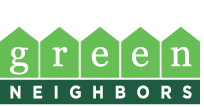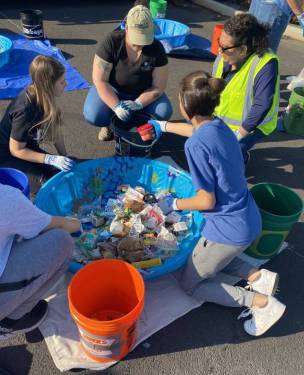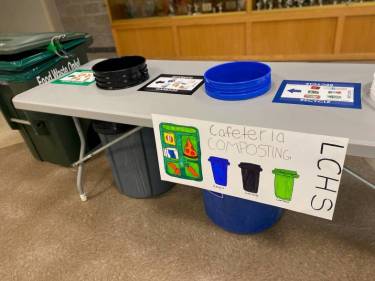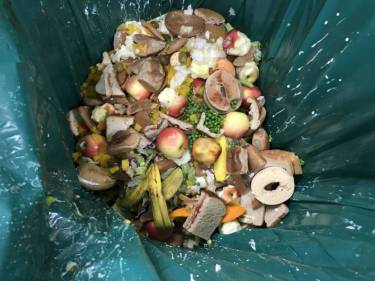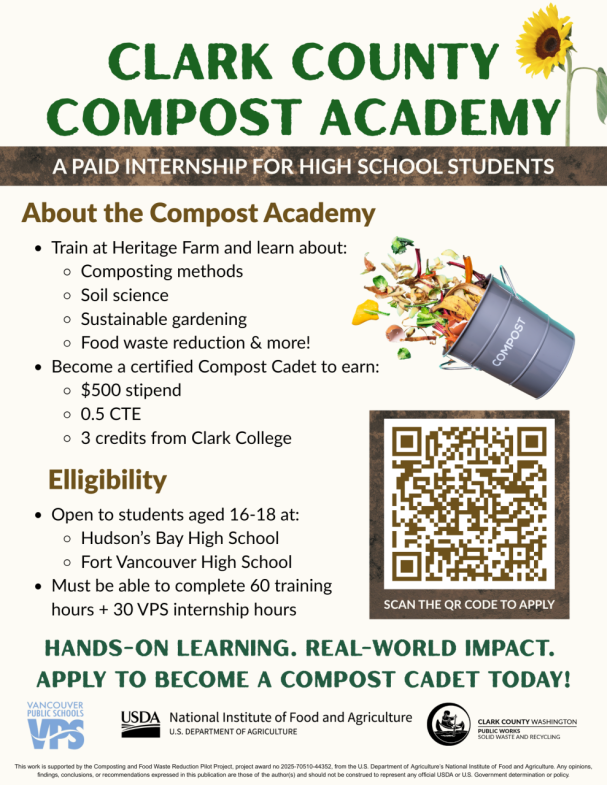Green Blog
Back to school in Clark County
By Linda Frederiksen, Composter Recycler Class of 2025
It's September and school is back in session. For many, it's a return to the traditional 3 R's of reading, writing, and 'rithmetic. At some schools in Clark County, the three R's of waste management are also part of the curriculum. Students at these green schools are taking action by participating in programs to reduce, reuse, and recycle to cut down on the amount of trash from their school. In schools, the amount of food waste that goes into landfills is staggering. It has been estimated that 30-40% of food is wasted in the US, while more than 41 million Americans, including nearly 13 million children, face moderate to severe food insecurity. Schools, which serve more than 4 billion lunches per year in the US, can be on the forefront of food loss and waste education and prevention (source: School Nutrition Association).
Locally, one of the many ways Clark County addresses this need is through the Clark County Green Schools program. I recently spoke by phone with Sami Springs LeCain, Green Schools program lead, about how the county encourages and supports environmental action in a school setting. Sami's background is in sustainability education and programming. The interview has been edited and condensed for clarity and length.
What is the Clark County Green Schools program?
The Clark County Green Schools program sits within the county's Public Works department, in the Solid Waste Education and Outreach team. We deliver waste reduction and recycling education and programming for all K-12 schools within the county. We work with all schools in Clark County, including public, private, charter, Montessori and even some home schools. We provide education and resources including waste audits, sort tables and share tables for cafeterias, composting and recycling assistance, and environmental programming.
What is a Green Team?
Green teams are student-led environmental clubs that partner with us to promote the 3 R's of reduce, reuse, recycle. Resources for starting your own school Green Team can be found on the Green Schools website.
How many schools participate in the program?
We currently have about 65 public and private schools participating in food waste collection in the cafeteria through sort tables. Some schools focus more on recycling and composting and we provide containers and bins to help with that. We partner with EarthGen, a statewide school sustainability certification program, to help school certify for the environmental projects they work on at school. More than 70 schools in the county have been certified.
What is a waste audit?
We partner with Waste Connections educators to get our hands dirty and learn about the school. We sort, separate, and measure waste generated in a single day, particularly food waste. The idea is to make sure only recyclables go in the recycling bins, only trash goes in the garbage bins, and only food waste goes into food waste bins. Last school year, we conducted an audit with La Center High School. They already have a sort table in their cafeteria, and on that day, they collected 72 pounds of food waste. Multiply that by 180 school days and that's 13,000 pounds of compostable food waste from one school diverted from the landfill!
How about sort tables - what are they?
We worked with a contractor to develop a prototype based on folding tables. Holes are cut in the top of the table and containers are placed under the holes. The first stop is for liquids, which is usually milk and water. Next comes true recycled material, like empty water bottles, cans, and milk cartons. Then comes the garbage bin where napkins, plastic utensils, plastic wrappers and baggies go. Finally, there's a green container for food waste. At the end of lunch periods, custodians roll the food waste bins out to fenced enclosures and Waste Connections picks the bins up weekly. The food waste is then sent to Dirt Hugger in Dallesport, Washington to be composted. Last year, 1.6 million pounds of school food waste was diverted from Finley Butte landfill to compost.
That's amazing! How does a school get started with food waste reduction?
Green Schools is an interest-based program, for people who want to improve sustainability at their school. We have a small team so getting around to every school in the county is difficult. Although we have standing relationships through past projects with many of the schools in the county, usually people find us through friends or folks at other schools - it's almost word of mouth. We are always looking for ways to connect with the community. Eventually organizations will be required by Washington State's Organic Management Law to reduce organic material by 75%. So, if you are a teacher, staff member, parent, grandparent, or student at a school that would like to learn more about the Green Schools program, please contact me at: info@clarkgreenschools.org
What's ahead for Green Schools?
We have some exciting projects coming up in the 2025-2026 school year! First, on October 23, we are hosting a Green Schools Secondary Student Summit for middle and high school students. It's a sort of mini conference at Clark College where students get a chance to meet other students interested in sustainability and other environmental topics and find inspiration to work on those projects during the year. There will be a similar summit for elementary schools in the spring. These are free events, with lunch, and are always a fun opportunity for everyone involved.
Additionally, we received funding from the USDA to develop an internship program for high school students at Fort Vancouver and Hudson Bay high schools. It's modeled on the county Compost Recycler program. There will be 60 hours of hands-on training for composting and recycling including waste reduction and prevention. Students will receive a $500 stipend, 0.5 credit in career and technical education (CTE) and 3 credits at Clark College. It's a cool program and great partnership. The program starts in October and runs through December. Check out the Green Schools site to learn more about Compost Academy and to apply.
Sami, thank you for your time today. Anything else you'd like people to know about the
Green Schools program?
Check out our website at: clarkgreenschools.org for more information and ways to support or participate in our work.

